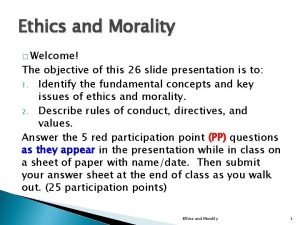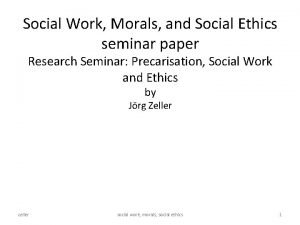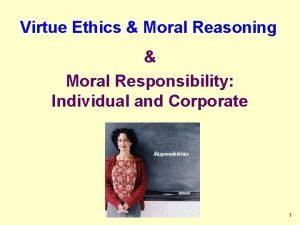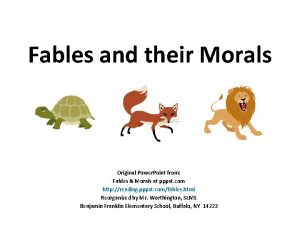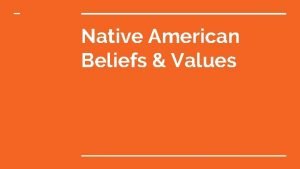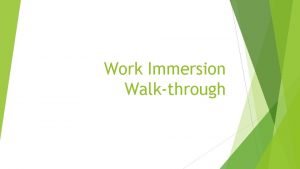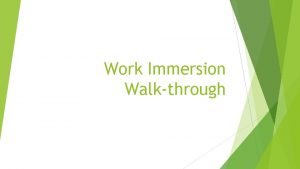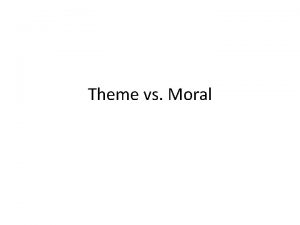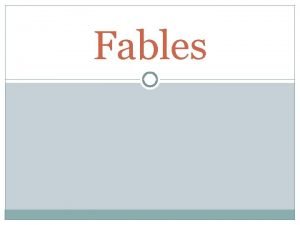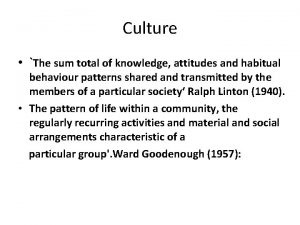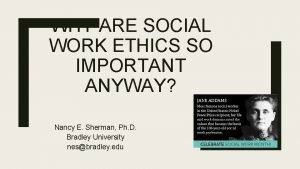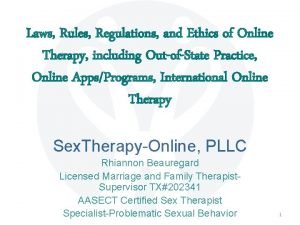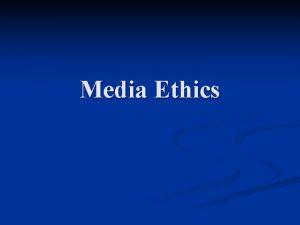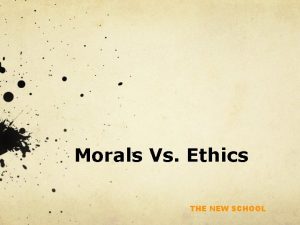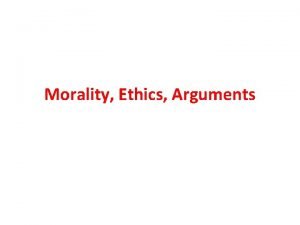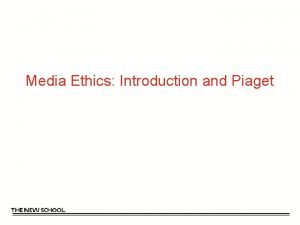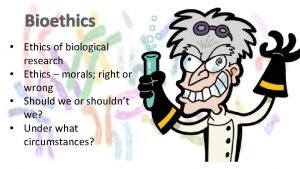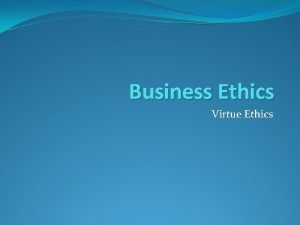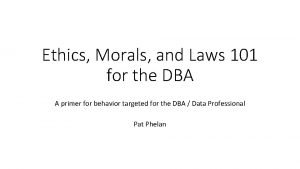Social Work Morals and Social Ethics seminar paper















- Slides: 15

Social Work, Morals, and Social Ethics seminar paper Research Seminar: Precarisation, Social Work and Ethics by Jörg Zeller zeller social work, morals, social ethics 1

Precarisation and social ethics If I understand the concept of precarisation rightly then it designates a societal changes that deteriorate the life conditions of an increasing number of society members. Precarisation can perhaps have accidental causes but it has obviously also systematic reasons in social systems that exist and develop by periodic precarisation of work and life conditions for the socially weakest part of the population. This will be social systems that operate with an integrated precarisation logic. If there exist such society forms working on the basis of periodic precarisation I will call them unethical; or more precise: societies with an unethical moral or mentality. zeller social work, morals, social ethics 2

Conceptualizing social work as practice field I understand social work as a profession in which a social community practices its ethics. By ‘social ethics’ I understand the ethics of a social community. I presuppose: a community can be understood as an agent, i. e. a subject of action/practice. By ‘ethics’ I understand the way of thinking (logic) of an agent to base actions/practices on intentions. I call it also: practice logics. ‘Intentions’ are wishes to realize desirable/valuable ends. Intentions are conceptually connected to values. They are members of the same conceptfamily (Wittgenstein 1963). zeller social work, morals, social ethics 3

Actions are constituted by • Agents or subjects of action – a subject is a conscious human being • Conscious human beings are able to experience, feel, imagine, remember, percept, conceptualize, predicate, infer, and act • Action organs – an agent’s body and optionally objective action instruments • An agent acts by activating or forbear to activate sensorimotor organs of his/her body; an agent’s body is according to Merleau-Ponty 1945/2006 to be understood as living body, i. e. an incorporated mind • Performance – the agent’s realizing of his/her/their intention • Result of the action – the by the action realized state, event or process • Consequences of the action – effects of the action on the agent and/or other agents or living beings zeller social work, morals, social ethics 4

Practice and its logic By ‘practice’ I understand a spatio-temporal extended system of actions, performed in order to reach a manifold of mutually connected ends. Practices can be professional or leisure activities – to cure sick people, to teach students, to sell or repair cars, to breed pigeons, to play football … Practices can be executed by a system of actions of single agents or by a system of interactions of a plurality of different agents. Interactions of human agents are steered by the different intentions of the interacting agents. By socially interacting humans realize their intentions – make the world meaningful or construct (Nørreklit 2006) a meaningful and valuable reality. The way how a community of agents construct a meaningful and valuable reality I call logic of practice or ethics of this community. I understand meaning and value realizing social interactions on the basis of Wittgenstein’s 1963 concept of language games as practice games. Practice games are on the background of my above considerations ethic games – a dynamic logic of practice. zeller social work, morals, social ethics 5

Practice field A practice field is a dynamic system of different practices, consisting in • Subjective action potentials, i. e. habitus forms (Bourdieu) • An agent’s habitus consists in his/her bodily and mental abilities to act in different ways, i. e. in his/her experiential, theoretical, and practical knowledge • Objective action potentials, i. e. capital forms (Bourdieu) • An agents different forms of capital consist in all those objective or institutional instruments and resources, he/she disposes of in trying to realize his/her intentions Thus practice fields consist (normally) of a plurality of agents, instruments and resources interacting with each other and thereby changing the quality and quantity of those habitus and capital forms, which make up the power structure of the field. zeller social work, morals, social ethics 6

Ethics and morals The function of ethics is to find out how an agent has to act to reach desirable ends (realize something valuable). Thus it is a way of practical thinking, a logic (or “grammar”, Wittgenstein) of practice. By ‘morals’ I understand the “realized semantics” of an ethics – i. e. the way an (individual or social) agent connects (maps) his/her/their way of thinking with a system of different types values. Morality is thus the realized ethics (way of practical thinking) of en agent. I call it also the mentality of this agent. The mentality of agents consists in their attitudes, customs, conventions, world views, etiquettes, etc. , i. e. how they in customary circumstances react on, understand, evaluate, and judge what they experience. The difference between ethics and morals can be described as the difference between how an agent thinks he/she should act under certain circumstances and how he/she actually does act. Ethics and morals are, however, members of the same conceptual family. zeller social work, morals, social ethics 7

Social Work as charity practice SW as a profession and practice field is ruled by a social community’s intention to help citizens in social need. Thus SW realizes the social ethics of a community assessing it as a desirable good to help people being in need. You could say SW is a community’s political and legal expression of a principle of charity. The principle could be formulated as follows: Help people in need to empower them to realize a good life. It could be based on a backing good-community principle: helping people in need to become able to realize a good life contributes to realizing a good community (good conditions for realizing a good life for all community members). zeller social work, morals, social ethics 8

Basis of ethics Ethics is based on two conceptual pillars of practical wisdom: • Free will of the agent • The agent’s valuation ability – to discover values among what there is and takes place • to motivate an agent to act presupposes, that he/she is able to differentiate between good and bad things/states/events , and to desire the good ones and to decline the bad ones zeller social work, morals, social ethics 9

Rationality and desire The free will of an agent is a consequence of his/her ability to reason, i. e. to think and behave as a rational being. Free will presupposes experience, emotionality (ability to become motivated), imagination, and rationality (ability to form concepts and propositions and to infer conclusions from premises). It would notably be impossible voluntarily to choose between different possibilities to act without being able to imagine possible states, events or processes that actually don’t exist or take place but can (by action) be made to exist or take place. An agent losing his/her ability to appreciate being alive, i. e. a person or community restricted, hurt or bereft of his/ her “optative” abilities (desiring, wanting, wishing, intending), will be heavily be handicapped in his/her abilities to realize a good life. – There exists overwhelming evidence that this not least holds for the victims of precarious work and life conditions. zeller social work, morals, social ethics 10

The agents of SW Social Work (SW) as professional activity takes place as an interaction between two social agents • social worker – a person professionally trained to help people in social need; in this function the social worker acts as a individual representative (civil servant) of the social ethics of her society • person in social need – a person not being able autonomously to create the basics of a liveable or much less a good life; he can in physical, mental and/or social respect be needy because of • either by birth or by accident being physically or mentally handicapped • or “made redundant” because of working place “economisation” (being fired) • or depression because of death of or separation from a loved • etc. zeller social work, morals, social ethics 11

Ethical reductionism The “bipedal” basis of ethical thinking can give reason to two forms of ethical reductionism, i. e. two ways to amputate ethics either • to liberalism (will to power, power is law) – all human beings are free by nature and can get what they want by really willing it; everyone is responsible of his own prosperity or breakdown – a person in social need is an agent with reduced will power and for this reason rightly a Social Work client* or • to economism - reduction of value-diversity to economic values (all capital is based on economic capital, all goods are commodities, the utmost end of human practice is to get rich) *a client is according its Latin etymology a socially weak person seeking protection of a socially powerful patron. In countries with a weak state and a powerful mafia it is usually the mafia with its patronage system that takes over SW functions. zeller social work, morals, social ethics 12

SW in ethically reductionist societies Present day western style societies try to combine a freedom-welfare based ethics with a liberalist-economistic reduced moral. The ethics of this kind of society requests that the community helps people in social need. Social work is in charge to do this – to help people with reduced action power (habitus) to (re)constitute their “will power”*. However, because of the reduced moral of this kind of society, SW gains paradoxical traits. *Liberalist minded politicians usually believe that people in social need just lack will power to turn their need into prosperity. Therefore their eagerness for shortening unemployment aid and forced activation arrangements for unemployed persons. zeller social work, morals, social ethics 13

The paradox of social work Reducing the agent-side of ethics to “free”* (pure) will power and the valueside to economy SW shall free the “social client” – a person handicapped in the execution of his/her will – by economistically reducing his/her social dignity to a minimum income needed to exist. A human person gets reduced to a economic quantity (economic man). In consequence, SW is in charge to free a “social client”, i. e. a person dependent of social mercy, by holding him economically imprisoned in a mere subsistence “capital”, i. e. in that form of society that has made him a person in social need. *The liberalist freedom concept is abstract insofar as it assumes a human being itself (by nature) free; i. e. free from all qualifying (subjective and objective) conditions enabling a person to choose between different action possibilities. The liberalist concept of freedom reduces Bourdieuan habitus to pure (“unpersonal”) agency, and Bourdieuan capital to pure economic action means. A concept of real freedom should instead define freedom by the subjective (habitus) and objective (capital) conditions (potentials) for intentional acting/practicing. zeller social work, morals, social ethics 14

Conclusion – sketching a possible solution of the SW paradox If social ethics is about how a human community enables its members to realize a good life then it seems impossible to help people in social need without changing the social conditions making people socially needy. Helping people to realize a good social life requests a good society – i. e. a society that doesn’t enable the good life of some citizens at the cost of the needy life of other citizens. zeller social work, morals, social ethics 15
 Difference between ethics and morals
Difference between ethics and morals Difference between ethics and morality
Difference between ethics and morality Define the term ethics and moral
Define the term ethics and moral Seminar paper
Seminar paper Moral duties
Moral duties The rooster and the jewel moral
The rooster and the jewel moral Native american morals and values
Native american morals and values Expected behavior in work immersion
Expected behavior in work immersion Goals in work immersion
Goals in work immersion H4uhd
H4uhd Do not be deceived bad company corrupts good morals
Do not be deceived bad company corrupts good morals Very short fable
Very short fable Culture is sum of
Culture is sum of Ethical rules screen nasw code of ethics
Ethical rules screen nasw code of ethics Social work code of ethics
Social work code of ethics Uwf tk20
Uwf tk20


